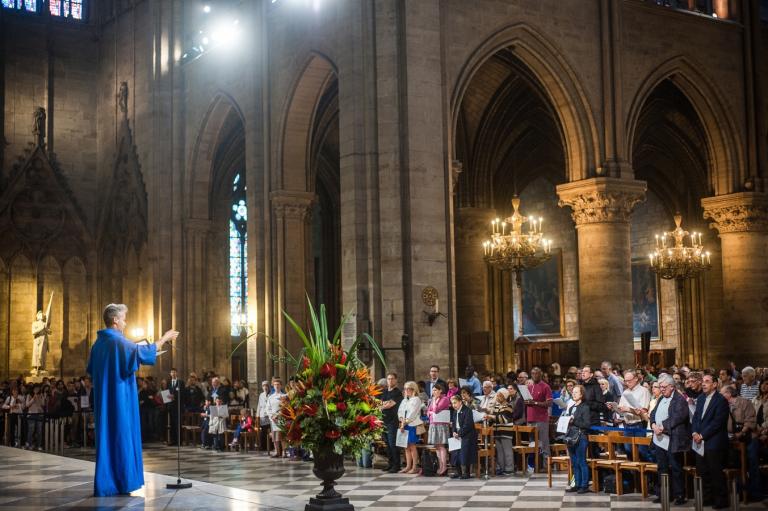The Pew Research Center has carried out a study of religion in Europe, finding that the picture is far more complicated than had been assumed.
The different conclusions drawn from the study are evident in the different news stories that have been written about it. The liberal leaning Religious News Service headline was Europe: Not as Secular as You Think. But the evangelical Christianity Today complained that Western Europe’s Christians Are As Religious As America’s ‘Nones’.
This is to say, by the standards of liberal theology, Europeans remain much more Christian than was expected. But by the standards of conservative theology, Europeans do not measure up.
So what did the Pew study find? Nearly two-thirds of Europeans (65%) consider themselves to be Christians. That’s only 6% fewer than the percentage of Americans who claim Christianity (71%). The percentage of “nones”–that is, people who are unaffiliated with any religion–is about the same (24%).
But only 18% of Europe’s professing Christians attend church services at least once a month.
Now here is where the Pew researchers, in my opinion, make a very big mistake. They lump together the 46% of self-identified Christians who don’t go to church much as “non-practicing Christians.”
But their research shows that the infrequent-church goers have much in common with church goers. And there are big differences between the beliefs of infrequent-church goers and the secularist “nones” who have no religion.
“Christian identity remains a meaningful marker in Western Europe, even among those who seldom go to church,” the study concludes. “It is not just a ‘nominal’ identity devoid of practical importance.”
The major difference between religion in America and religion in Europe is that 53% of Americans and 68% of the Christians say that religion is a very important part of their lives. Even among American “nones,” who have no religion, 13% say that religion is important in their lives. Whereas in Europe, only 11% of Europeans consider religion to be very important in their lives, as do only 14% of the European Christians. So, yes, American “nones” are more religious than European Christians.
Looking further at the Pew Report, I would say that European Christians have more widely embraced liberal theology than have Americans. Europe may be the only place on earth where liberal theology has been embraced not just by church seminaries and clerical bureaucracies but by the people themselves. And what they have learned from liberal theology is to compartmentalize their faith and their life. That Christians should follow the values of the dominant culture rather than traditional teachings. And that they do not really need to go to church. Just as church attendance has dramatically fallen off in America’s liberal mainline denominations, this is happening in Europe, though on a much bigger scale, since virtually all of the state churches have embraced liberal theology.
And yet, something remains, even in these infrequent-church attenders. But it isn’t clear from the Pew study exactly what that is. The study asks about their attitudes towards immigration and nationalism, which accord pretty well with the views of the 18% of church goers. Also about their view of the “Biblical God,” as if people who seldom go to church would even know what that is.
I wish Pew researchers would ask some questions that actually are determinative of the Christian faith: Who do you think Jesus is? Do you believe that Jesus died for your sins? Do you believe Jesus is your Lord and Savior? Do you believe in Heaven, and, if so, how does one get there?
As I’ve discussed in this blog, in supposedly secularist Denmark, when questions drilled down to the issue of Christ, 25% of the Danes believe that Jesus is the Son of God, with 18% affirming that He is the savior of the world. Compare that to the percentage of evangelical believers in the United States, which is reportedly between 13% and 25%.
But another lesson of this study is that the conventional categories are losing their usefulness. An article in The Atlantic quotes UK scholar Linda Woodhead: “So it’s not that we’re seeing straightforward secularization, where religion gives way to atheism and a rejection of all aspects of religion,” she said. “We’re seeing something more complex that we haven’t fully got our heads around.” Secularism scholar Joseph Blankholm concludes, “These categories are at their limit—they’re in some ways outmoded.”
Are Muslims who do not attend Mosque every Thursday considered “non-practicing Muslims”? Their religion does not require them to do so. Christians who do not attend worship services very often are not necessarily “non-practicing.” If they tend to form their own personal theologies apart from church authorities, they might just be a certain kind of Protestant.
As far as how many Europeans have faith, though the size of a mustard seed, that will bring them salvation, no survey can show that. Undoubtedly, there is a great need for the Gospel. But the European nations, while not devout, are not fully secularist either. Europe is still “Christian” at some level. It just needs to relearn what that means.
Photo of a church service in Europe via Pxhere, CC0, Public Domain














